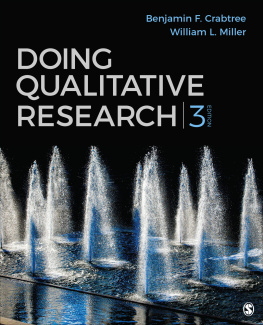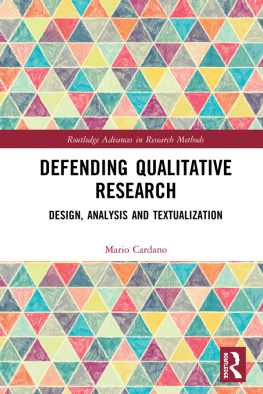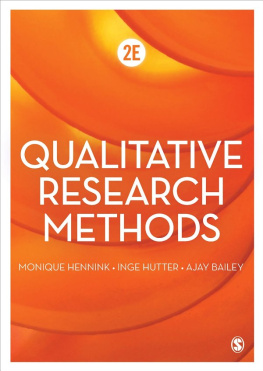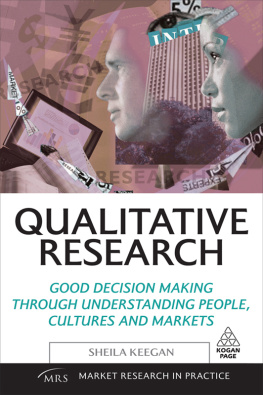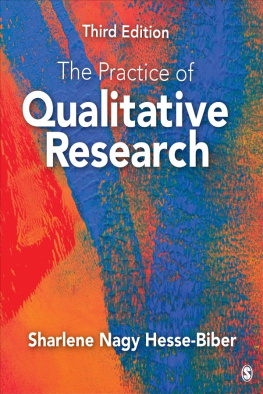A Journey Through Qualitative Research
Dedication
To our students
A Journey Through Qualitative Research
From Design to Reporting
- Stphanie Gaudet
- & Dominique Robert
SAGE Publications Ltd
1 Olivers Yard
55 City Road
London EC1Y 1SP
SAGE Publications Inc.
2455 Teller Road
Thousand Oaks, California 91320
SAGE Publications India Pvt Ltd
B 1/I 1 Mohan Cooperative Industrial Area
Mathura Road
New Delhi 110 044
SAGE Publications Asia-Pacific Pte Ltd
3 Church Street
#10-04 Samsung Hub
Singapore 049483
Stphanie Gaudet and Dominique Robert 2018
First published 2018
Apart from any fair dealing for the purposes of research or private study, or criticism or review, as permitted under the Copyright, Designs and Patents Act, 1988, this publication may be reproduced, stored or transmitted in any form, or by any means, only with the prior permission in writing of the publishers, or in the case of reprographic reproduction, in accordance with the terms of licences issued by the Copyright Licensing Agency. Enquiries concerning reproduction outside those terms should be sent to the publishers.
Library of Congress Control Number: 2017947699
British Library Cataloguing in Publication data
A catalogue record for this book is available from the British Library
ISBN 978-1-4462-6712-7
ISBN 978-1-4462-6713-4 (pbk)
Editor: Jai Seaman
Assistant editor: Alysha Owen
Assistant editor, digital: Chloe Statham
Production editor: Katherine Haw
Copyeditor: Neville Hankins
Proofreader: Andy Baxter
Indexer: Charmain Parkin
Marketing manager: Ben Griffin-Sherwood
Cover design: Bhairvi Gudka
Typeset by: C&M Digitals (P) Ltd, Chennai, India
Printed in the UK
About the Authors
Stphanie Gaudetis an Associate Professor in the School of Sociological and Anthropological Studies at the University of Ottawa, Canada. She teaches qualitative research at the undergraduate and graduate levels as well as political sociology and life course analysis. Her current research interests include civic and political involvement, sociology of youth and family, as well as life course analysis.
Dominique Robertis an Associate Professor in the Department of Criminology at the University of Ottawa, Canada. She teaches qualitative research at the undergraduate and graduate levels as well as courses on science and technology. Her current research interests include scientific and technological controversies as well as the biographies of scientific objects in behavior genetics and neurosciences.
Acknowledgments
We are grateful for all the support, assistance, friendship and conversations we had during the thinking and writing of this book. We owe a lot to a Quebec tradition of qualitative researchers such as Pierre Paill, Jean Poupart, Jean-Pierre Deslauriers, Lionel Groulx, Anne Laperrire, Robert Mayer and Alvaro Pires. They founded a tradition of inductive researchers informed by the American tradition of the sociological Chicago school and the European epistemological and theoretical tradition. This book is largely inspired by their teaching. We also owe to our students from the past 15 years at the undergraduate and graduate levels. They helped us learn and communicate qualitative research. We are indebted toward Alexis Truong for the meticulous formatting work but mostly for the enlightened comments on the previous version of the manuscript. We are very appreciative of our colleagues in the Department of Criminology and the School of Sociological and Anthropological Studies, namely Chris Bruckert, Maritza Felice-Luna and Martin Dufresne, for discussions on research, pedagogy and all the rest. We are grateful to Franoise-Moreau Johnson at the Centre for Academic Leadership at the University of Ottawa for the writing retreats and writing groups she organized. This project has been made possible with the financial participation of the Office of the Vice-President Academic and Provost, University of Ottawa. We also want to thank Uri Ben-Gal for his diligent editing and translation work as well as the reviewers whose comments made the last version better and more consistent. This book could not have come to fruition without the patience and support from our editorial and production team at SAGE, namely, Jai Seaman, Alysha Owen, Katherine Haw and Neville Hankins. Finally, qualitative research can exist because of all those people who are willing to share their life experience at length with all of us who are trying to make sense of the world we live in. Thank you to all the people who make empirical research possible, especially Michael Parenti and Jodi.
Preface
How do people become politically involved in their communities? Why do young adults participate in cosplay and immerse themselves in manga culture? How do senior citizens come to equate a prescription for a drug with a gesture of care on the part of their family doctor? What rationales do correctional officers use to send a prisoner to disciplinary confinement? How is neuroscience mobilized to give a new legitimacy to the controversial diagnosis of psychopathy? What are the life-trajectory commonalities among high school dropouts? How do citizens produce and publicize their own scientific knowledge in order to resist the fracking industry in their area? Asking and answering incisive questions are your tasks as students of the social world we live in. This is especially so when you undertake a formal qualitative research project as part of your studies or your job.
Research is an exciting endeavor. Having the time (but never enough) to dedicate yourself to the completion of a research project that is important to you is a treat. Reading thoroughly the research and theory pertaining to your topic; gathering or producing research material; analysing it all and proposing an interpretation in sum, generating knowledge is a privilege. But it does not always feel like it. Undertaking a research project is an uneasy journey with unplanned detours, necessary reappraisals of the efforts needed to continue, and quite a bit of soul searching. In our experience, there is no avoiding some discomfort in the process. However, it is easier to go through it with a guiding team. Over the course of 15 years of accompanying students through their first undergraduate qualitative research projects, their Masters theses, as well as their PhD dissertations, we have had the good fortune to be part of many successful guiding teams. And it is in this spirit of guidance that we have written this book.


